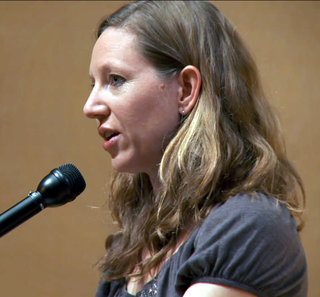Top 23 Quotes & Sayings by Maggie Nelson
Explore popular quotes and sayings by an American poet Maggie Nelson.
Last updated on November 15, 2024.
There's that layering of selves that we can have with someone else across a long relationship. I go to the baths, the Korean spa. I love looking at the maps of people's bodies. The women have so many mastectomy scars and ectopic pregnancy scars and stretch marks, and all these things are amazing and wondrous to me. I guess I find it stranger not to attend to flux than to attend to it. But in a relationship it's also scary - you don't know where you're going to end up when you go through change.
It is easier, of course, to find dignity in one's solitude. Loneliness is solitude with a problem. Can blue solve the problem, or can it at least keep me company within it?-No, not exactly. It cannot love me that way; it has no arms. But sometimes I do feel its presence to be a sort of wink-Here you are again, it says, and so am I.
I love language. It doesn't bother me that its effects are partial. To me that is very sanity-producing. It would be weird if the effects of language were more than partial, if your whole life existed within your texts. That would be much scarier to me than language being an inadequate tool to represent.
Not to be too doctrinaire, but we live in the patriarchy! And therefore anything explicitly associated with the female gender, including motherhood, needs to be defensively claimed, because it's either devalued or sentimentally idealized, but not supported. I so thoroughly believe that female human beings have worth that I don't feel the need to argue it, but I think that there's a part of me that very specifically wants to make space for those ideas to be centralized, if only for the moment.
I think writing kind of burns out the flaming question. Sometimes it might feel like when you're living with certain paradoxes and they're unarticulated, you feel pressure to choose. I feel more comfortable living in the paradoxes that I've named and laid out, whereas when I started they might have felt like real agitations. At least I see them more clearly after having sketched them for myself and made a place to stand in relationship to them that felt okay enough to last through the course of a book.
I know that a lot of feminist fears about the trans movement have been, "Wait, we never got to the part where we focus on women! We tried for a minute, but we don't want to lose the category all of a sudden. We haven't heard yet from the females with children called mothers, we haven't heard yet from all these groups!" On the one hand I'm very sympathetic to that, but the category of Women or Mothers, any of these categories, are on shifting sands and always have been.
Whenever you get involved with talking about rights, you're talking about being a citizen. You're talking about being a citizen in capitalism; you're talking about what rights are granted to what identities, under what laws, and all that is a big mix. Marriage is, among many other things, a formality to channel capital through a family. And that's why the big DOMA lawsuit was about paying too many taxes! "I wouldn't have had to pay all these taxes if Theodora had been Theo" - that was the big tagline. It's all about protecting assets.
I feel excited in that I think boys born to feminists have a leg up. At least, the ones I've met seem like they do. There's something really vital about that exchange. I think I'd only imagined, beforehand, handing down a feminism to a young girl. But I'm newly excited by the challenge of raising a boy.
For pragmatic reasons, for lessening of violence and for allowing people to live better lives, I think that the march forward for GLBTQ+ rights is a worthwhile one. But for me, hopefully the frontier is alliance-making across all the social issues, whereby people can get over whatever prejudices they're holding in order to keep their eyes on making livable lives for people in all states of vulnerability, no matter what their gender, sexuality, race, class, origin, whatever.
Most of the bio men on earth were born to women, so it's pretty ordinary! But I think because I had come from a matriarchy - my father died when I was young, and I only have a sister and a stepsister - when I told my mom and my sister that I was having a boy, they were both like, "That does not compute within our family relation!" It was like, "Girls only here!" Now that all seems very strange to me.























